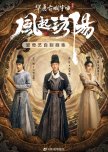
Wild goose chase.
Ancient conspiracy thrillers are right up my alley so I looked forward to Luoyang with bated breath. This is set in Shendu (now Luoyang), capital of Wu Zetian's Wu Zhou Dynasty (690-705). As the only female emperor in over 5000 years of Chinese history, Wu Zetian remains a controversial figure - an ambitious, usurper whose exceptional intelligence and leadership is only matched by her ruthlessness against anyone in her way, including or especially her own children. She cultivated informers and multiple secret police and spy rings that gathered evidence against her detractors. and maintained a careful balance of power between the important political structures of her administration. This is reflected in the drama in the clear delineation of responsibilities between the Judiciary, Inner Guard and Secret Police (Lianfang). During this time, the Wu clan and Li clan were embroiled in a power struggle which persisted until Wu Zetian intervened and clarified her succession plans. Nonetheless it ended in messy plotting, betrayals and twists that are drama worthy in and of themselves. This is rich fodder for conspiracy plots such as this one.The drama starts thrillingly with a bold daylight assassination of an informer and his daughter and the ensuing dizzying high speed chase through the streets of Shendu. All three main protagonists mortician Gao Bingzhu, foodie Baili Hongyi and inner guard Wu Shiyue are at the scene and invisible threads from their past pull them together to uncover a much deeper conspiracy that could rock the very foundations of Wu Zetian's empire. Clues emerge that connect seemingly unrelated cases and force the three protagonists to work together, at first reluctantly and with selfish agendas and then with growing mutual respect and trust that blossoms into deep friendships. I most enjoyed the tripartite friendship in the drama and would have liked to see it better explored rather than unnecessary romantic arcs. Huang Xuan nailed it with his cynical yet paradoxically idealistic Gao Bingzhu; whose shrewdness and insight into dark hearts of man does not extend to those he cares for. I also did not see much chemistry between him and Song Qian who impresses with her fight scenes but falters somewhat in her line delivery. Wang Yibo's performance is strong in some aspects but uneven overall with too many scenes where he is clearly unsure what facial expression to wear. This role does not elevate him for me from an actor that I don't mind watching but wouldn't seek out. That said the trio has enough combined chemistry that I am happy to watch them together again. As for Song Yi, she has gotten enough flack and her character was so poorly written that all I will say is this is a role such a wonderful actress should have just passed on.
I did not enjoy the first two episodes of the drama - too much was happening at the same time and the cameraman swung the camera so wildly I thought he was possessed. The action scenes are exciting and well choreographed enough they did not need to artificially augmented by cheap camera tricks. After the psycho camera settles down, the plot unfolds at an intense and exciting pace against a gorgeous backdrop of dazzling sets and with a deluge of colorfully garbed denizens - they must have hijacked and costumed practically every Hengdian tourist as extras on set I have never seen so many people crammed into each scene. My personal favorite set is the Unwelcome Well which looks almost too inviting to be a ghetto. While the costumes and certain props are anachronistic, everything comes together is such a vibrant and captivating panorama that it scarcely matters. This is complemented by well designed side characters that are based on well known historical figures. Hints of their personalities, scandalous affairs and alliances are quite faithful to history and add a nice ambiance to the setting. It set up for intriguing Dumas like plot twists that didn't materialize.
This drama builds to a top-notch, shocking and heartbreaking climax prematurely at episode 20 where both actors delivered standing ovation worthy performances. It achieves that perfect sequence of shock followed immediately by stunned comprehension and acceptance as all the clues rushed to the fore to blindside the viewer to the next unfolding twist. In the second half, the plot visibly loses momentum and digresses into romantic arcs that don't belong in this genre and filler maudlin flashbacks. The writing of the mini-threads in the second half is insipid with excessive gratuitous character implants, many of whom delivered cringe worthy performances.
In hindsight it would have been difficult to top the fantastic mid-drama climax but it is still extremely disappointing for the final reveal to be so bland. The hollow villain that everyone was on to as a bad guy early on but dismissed as too obvious turns out indeed to be the final villain, one that is not worthy of being called a mastermind. Both their motive and end game plot is not well articulated or convincing. Multiple clues and more interesting suspicious characters that don't play out leave me feeling like I went on a wild goose chase. I don't know if they ran out of money or wasted it on too many bodies but there is no sense of peril or excitement in the final showdown. Forget explosions or collapsing buildings, we don't even get one good last fight scene. The final insult is how unfathomably a feather brain like Liu Feng manages to find himself in the right place at the right time to deliver an unnecessary and uncalled for outcome. This is just a misguided attempt to deliver an audience shocker to make up for the nothing burger of a final reveal.
Even though this remains a very entertaining and highly recommended watch, the ending is a big let down that knocks 0.5 off my final rating for the show. I feel that an 8.0 is the best I can give to this show, which is still one of the better c-dramas of the second half of 2021.
Was this review helpful to you?
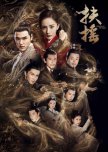
Fantastic appetizer but don't bother with the main course and desert.
This drama really wowed me at the beginning - heart stopping kungfu fight scenes, the two leads had good banter and chemistry, the set was gorgeous (obviously big budget) and the story had a good balance of intrigue, romance, action and good and evil characters. I was hooked and truly enjoyed the first 25-30 episodes of it. Then just when you are at the point of addiction, the show peaks, which is just plain cruel. And then in a truly impressive way the show crashes and burns, getting progressively worse as it advances. I kept watching in the desperate hope that it would turn itself around but sadly it did not. It was as if an entirely different production crew took over and set out to purposely destroy the show. The plot meandered down multiple mind numbingly boring and ultimately repetitive political plots to steal the thrones in 3 of the 5 kingdoms only to be foiled by Fuyao and her friends. There were lots of unnecessary side characters and multiple unanswered and non sequitor sub plots. Not to mention the many long winded and boring philosophical discussions that I strongly suggest fast forwarding through unless you have trouble falling asleep at night.Ethan Ruan and Yang Mi were great together most of the time and especially at the beginning. However, there were long periods where Fuyao/Yang Mi was on her own and the story/actress could not really carry those moments alone, frequently coming across as reckless and annoying. I did not love the supporting cast either and I felt that Vengo Gao's role/storyline was almost as if they were trying out two potential male leads with parallel (repetitive) plots to see which was better. Obviously Yang Mi and Vengo have zero chemistry and that sub plot that went on forever should have been eliminated altogether. I guess the entire crew was being paid by the episode judging from how it ended up being all pasted together to create one big mess of a storyline. Its a shame because this could have been a terrific and memorable (much shorter) drama with some ruthless editing and tighter script/plot writing.
The only thing epic about this drama is the effort I had to put in to see it through the end. Starts with a bang and then death by a thousand cuts of boring inanity. This is one of those shows that definitely would have benefited greatly from the latest Chinese government ban on excessive budgets that lead to too many unnecessary episodes in Chinese costume dramas. To be fair, I would say the first say 30 episodes are actually worth watching. If you can endure some suffering you can even watch a few more episodes until Fuyao discovers Wu Ji's real identity. After that, do yourself a huge favor and drop it. You will just feel angry and cheated if like me, you persist until the bitter end because it then becomes just so, so much more bad than good.
Was this review helpful to you?

But I have promises to keep, and miles to go before I sleep.
Patience is required for this drama that is unlikely to enjoy broad appeal. It is a Beijing Academy student production so don't expect high production values; indeed there is a distinctly amateurish and unpolished feel to the entire effort.The shadowy and suspenseful plot is steeped in the supernatural and mythology and takes a long time to unfold. The synopsis, which already gives away much of the story adds to the impression that nothing is happening. Hidden forces conspire to release the demon Jiu Ying, that according to legend was sealed by five deities representing the five elements (metal, earth, water, fire and wood). This manifests itself in increasing hostilities between the You Kingdom and the Wolf Tribe that make war and chaos seem inevitable. These events bring the three siblings Hongxuan, Hongyi and Hongshou whose Baili family has long been the power behind the You throne; together with Ming Yefeng, the leader of the Wolf Tribe who also has a mysterious past with Hong Yi. They are linked by destiny and rediscover their powers so that together with other supernatural beings from a past lifetime, they can once again fulfill an ancient promise to keep the world safe. It is not a complicated or super original fantasy story that culminates in an epic clash between good and evil.
What is interesting about this drama is the characters and the acting. The actors are not given much to work with in terms of dialogue so they have to rely heavily on body language and subtle expressions to convey their characters. This makes the complex characters particularly difficult to get to know and nobody is as they originally appear. It is very difficult to tell who is friend and foe and what their motivations are. For most of the drama, Baili Hongxuan and Ming Yefeng were the most complex and interesting characters for me. While they are both quite grey, both turned out to be quite different from what I expected and almost opposite of each other. I really enjoy this kind of peeling of the onion approach in terms of how a layered character gradually becomes unveiled but many will find this kind of storytelling frustrating and boring.
I suspect many may be interested in this because of Wu Lei and Song Zuer. I admit I discovered this because of Wu Lei. While his character Baili Honsghou is quite one dimensional - the typical c-drama hero that goes through many common tropes; it is the best performance I have seen from Wu Lei since NIF. It is very nice to see how far he has come as an actor; that he is not just an incredibly athletic lean, mean, killing machine. As for Song Zuer, she is an actress that provokes strong reactions, especially when she plays the bratty young girl. I never minded her that much because I always noticed that she has screen presence that belies her small size and her performance in this also showed much progress and was actually quite nuanced towards the end. And it will be remiss of me to not mention how super hot Zheng Kai's Ming Yefeng is - I can't believe I have never seen this actor before!
The story advances much more quickly in the last 10-12 episodes although it appears a bit messy as many characters are introduced at once. But they are not interesting characters and all you need to really know is that they are either obstacles to be overcome or they are there to give some assistance along the way. All of the substantively relevant characters are introduced at the beginning. There are a few nice twists at the end with respect to the emperor as well as the mysterious man in the hood. The ultimate villain (to me was not Jiu Ying) was hiding in plain sight the whole time but their motive for unleashing evil on the world was pedestrian and lame. Most of the so-called heroes or deities in this show have feet of clay, do not have high morals and are not particularly enlightened beings. The story is very matter of factly callous in its treatment of spirits or demons. This is very typical of the genre so if you are familiar with Chinese mythology, you will not be surprised by any of this or how the story ends.
I enjoyed this drama but it is not for everyone. Watch at your own risk.
Was this review helpful to you?
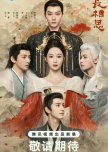
The Return of the King.
After closing Season 1 on a high note, the much anticipated Season 2 of Lost You Forever opens with an air of looming inevitability. The focus shifts from Xiaoyao to Cangxuan as the main plot is built around the return of the king who is meant to unite Dahuang. This also portends the end of the long stalemate between Xiyan and the Chenrong remnants. This kind of endgame puts all of the main characters at crossroads with difficult, heart wrenching choices to make.Season 2 has not been as well received as Season 1 and the bulk of the disappointment is around how unlike Season 1, Season 2 deviates from the novel on a few fronts. I didn't read the novel so I can only evaluate the drama on its own merits. From my perspective, the season's biggest weakness is that the plot arcs leave a rushed, condensed impression. This shouldn't be a surprise as topics involving conquering harmless neighbouring states and glorifying rebels don't fare well with Chinese censors. I also had to scoff at the idea of a war with no civilian casualties; if this were a plot driven story I would be quite disappointed.
But Lost You Forever is predominantly a character story and on that front, the character arcs deliver in spades. Even though many characters make choices that are not relatable, they are not meant to be. Novelist Tong Hua designed the characters for both the prequel novel Once Promised and Lost You Forever based of mythical creatures from Shānhǎijīng/山海经, The Classic of Mountains and Seas. This is an ancient Chinese geographic compilation of mythical monsters and magical creatures; kind of like Hogwart's Monster Book of Monsters. This story is set at the beginning of time, after Pangu and Nuwa created the world. Xiangliu is a mythical beast, a venomous nine-headed snake monster loyal to water deity Gonggong. Cangxuan and Xiaoyao's grandfather the Xiyan King is none other than Huangdi/黃帝, the legendary Yellow Emperor. They are early immortals, directly descended from primordial gods whose footprints can still be found in the shape of the mountains and seas. They live for an unfathomably long time; until their obsessions eventually get the better of them. This explains Cangxuan's darkening and Xiaoyao's overpowering fear of loneliness and abandonment.
Even though this story broke my heart, all of the important characters are true to themselves and fulfil their destiny. I did not always agree with or like their decisions but the storytelling is elevated by phenomenal acting that compelled me to understand their choices and accept that their decisions made sense for them. My only disappointment with the season is that plot-wise it sagged and is not strong enough for me to raise my rating for the drama overall to a 9.5/10.0. It is nonetheless an immersive, heart-rending and dark enchanted fairytale about flawed but unforgettable characters who are trapped by destiny. I rate both the second season and the adaptation in its entirety 9.0/10.0. Watch it but guard your heart and do not grieve too hard for them because their fates are to a large extent predestined.
SPOILER WARNING
The rest of this review does not avoid spoilers and is best read after you have finished watching this drama in its entirety.
I may be in the minority but even though I almost drowned myself in wine, I think the ending is perfect and fitting. Xiaoyao is a flawed and broken character that regresses as the narrative advances. Her strongest, happiest, moments were in Qingshui Town, when she lived among mortals as Wen Xiaoliu. The only thing she lacked was a companion. When Ye Shiqi, another lost immortal came along, her life was complete. Even though Tushan Jing is a weak character that let Xiaoyao down repeatedly, he is kind and when it mattered, he was willing to be Ye Shiqi again so that she could be Wen Xiaoliu again. He was the safe choice and the only choice Xiaoyao was capable of making. Even though I will never like it, I understand it and I can live with it. The best, most magical arc was always the Qingshui Town arc so the drama closes there, in a full circle.
Cangxuan is also a damaged and abandoned character whose his mother chose to die with his father over living for him. Thus Xiaoyao and Cangxuan share a deep and complex bond that goes beyond their childhood oath. From the get go, the way they deal with their shared trauma put them on forever opposite paths; he chose to be invincible while she chose to be invisible. Xiaoyao only reclaims her identity and returns to the perilous world that cost her everything because of her promise to Cangxuan. She faces her demons, relives the worst days of her life and puts herself in harm's way to be his pawn; the princess bride that paves his way to the throne. She never looks happy or carefree again after she becomes Xiaoyao.
The great irony in their story is that Cangxuan seeks power to protect Xiaoyao but once he attains power, he becomes the greatest threat to her. He is Xiaoyao's hero that lived long enough to see himself become a villain. Had Cangxuan given in to his worst instincts, it would have been unforgivable and it would have destroyed them both. I am relieved the drama only showed us what would have happened and then walked him back from the brink. Cangxuan did many things he regrets along the way, which he describes as 遗憾/yíhàn and not 后悔/hòuhuǐ. This means he did what he had to do; that he did not really have free will. The turning point in his character is when he admits there was one pivotal moment he regrets (后悔/hòuhuǐ); when he should have chosen Xiaoyao but he chose the throne instead. But even after he owns his choices, I feel a frisson of fear at his disarming smile that is belied by the dark longing expression in his eyes. Xiaoyao will never be truly safe from him so Xiling Jiuyao disappears among those who die collecting and documenting rare herbs throughout Dahuang.
A'Nian is the best character in this story. She is the spoiled but brave and true Haoling princess who grew up with the security of a loving family and her beloved Cangxuan gege. She is who Xiaoyao should have been and she is living Xiaoyao's best life. She dares to put herself out there, to take risk in love without needing to be loved in return. I hope one day Cangxuan understands that Xiaoyao did choose him; that her name is A'Nian.
As for Xiangliu, he understood Xiaoyao best and loved her most selflessly. But by the time they met, he had long ago pledged all nine lives to his lost cause. After leading so many men to fight to the death, it is not clear Xiangliu could have just walked away even if Xiaoyao asked him to. It would have been a risky, reckless and consequential path for both of them; the story of Chi Chen and Xiling Heng could repeat itself. Xiangliu and Xiaoyao waited for each other to cross the line for a very long time; far longer than Xiaoyao waited for Tushan Jing. But the inescapable truth is after everything she went through, Xiaoyao is too broken. As the consequence of two people who loved recklessly; she could only choose to be loved. Xiangliu is himself not free either so he accepts this. For him their brief entanglement had to be enough. If Xiaoyao had been A'Nian, she would have dared to choose him except his path would have never crossed with that A'Nian, only Xiaoyao. They were just never meant to be. And so Xiangliu frees her from missing him forever and leaves her with someone to rely on and go home to. Even though she will never be burdened by knowing the full extent of everything he did for her, Xiaoyao grieved deeply for Xiangliu. To me, her silent, helpless adult tears were far worse than the way she child ugly cried for her parents. I do wish he had left her the real Chubby but I guess it was not possible since Chubby would have gobbled up Tushan Jiing and spat out his entrails.
Even though both Zhang Wanyi and Yang Zi deliver outstanding and compelling performances, Tan Jianci's portrayal of Xiang Liu is simply iconic. I can't remember when I was last so mesmerized by a character. Even though it shattered me, Xiangliu fulfils his destiny in an epic, climatic ending that is what legends are made of. According to Shānhǎijīng, Xiangliu left behind a patch of earth so toxic that nothing grew or lived there again. I know book readers are not satisfied with the ending but for me it is an incredibly sad but beautiful and fitting way to end a story about love that is not a love story. My only regret is I didn't get to see Xiaoyao shoot Xinyue in the heart. I mean to make time to read both the prequel and the novel so I won't spoil myself the book ending. But if it is at least this good, then I love it already.
X
Was this review helpful to you?

Women should not rule the world.
The Legend of Zhuohua is another in a string of recent female empowerment themed historical romantic dramas. The production is upfront that this drama is a work of pure fiction. It is impossible for women to exercise the kind of influence and authority portrayed in this story in ancient Chinese patriachical society. The attitudes and values articulated are also incredibly modern and unsurprisingly, resonate with current audiences. It should be enjoyed at face value accepting that many aspects of it are sheer fantasy.Titular character Ma Zhuohua flees an arranged marriage to the capital; where she must pass the imperial exams to fulfill her ambition to be a female official. Quick witted and resourceful, she saves Lord Ding, a decorated war hero, when he is wouded in the middle of a clandestine operation. Their fates intertwine as he is the strongest advocate of opening up scholarship and official positions to women. As they collaborate on official assignments and work toward their shared vision of the country, they fall in love. Can their relationship navigate a feudal system that requires women officials to choose between marriage and their career?
The most enjoyable arcs of this drama are the early courtship ones. This is the first time I have enjoyed Jing Tian's playing such a clever, demurely mischevious and independent character. Despite a ghastly white color filter and not the best dubbing, the strong chemistry between Jing Tian and Feng Shaofeng is unmistakable. It is so refreshing and very hot to see such a candid, lively and purely adult relationship dynanic laced with flirtatiously racey dialogue. The humor is very well written and so cheekily portrayed that I laughed uproariously many times, and especially at the dirty jokes. The political commentary and philosophical debates are surprisingly well written, with a sophistication beyond what I would expect of a light romantic comedy like this.
Outside the empowerment theme, the sub-plots are not special but this top notch veteran cast is very charismatic and executes so well it makes up for some of the lack of originality. Both Shi Yueling and Wang Likun in particular deliver formidable, almost terrifying performances as Empress Dowager Zhou and Princess Roujia. I also found Roujia's complicated relationship with Shen Jinghong very interesting. Unfortunately just after the mid-way point, the narrative rehashes tired plotlines including noble idiocy, murder most foul and high treason. In quite a similar vein to Destined, it nose dives into a poorly designed political melodrama and predictible twists. Even incredible acting cannot paper over that this is yet another delusional ends justifies the means antagonist with an unconvincing villain origin backstory.
This would have made a much better 20 episode drama that ended on the intended message that women should seize their dreams. The writers took it one step further into women can also seize the world. And then left us with an unambiguous message that women should not rule the world. The first few arcs of this are worth about an 8.0 but the latter arcs are just 6.0/6.5. I can only give this a 7.0. Its still a quality production with some good laughs to pass some time but it won't rock your world.
Was this review helpful to you?

This review may contain spoilers
Just Say No.
This is not an easy drama to watch. It shines an unflinching spotlight on the unchecked, oppressive soft power of the uber rich and how society and by extension the legal system holds victims to an impossible standard of perfection. The narrative opens with a married, high powered CEO Cheng Gong caught in flagrante delicto with his assistant Zhao Xun, after an inebriated night of corporate entertainment. The media is at the scene and a full blown scandal ensues with dire consequences for both parties. Cheng Gong's team of fixers led by his relentless public relations executive Li Yi and a sharp lawyer Lin Kan swoop in immediately to understand and contain the situation.As the facts emerge, it becomes clear that Cheng Gong and Zhao Xun remember the night very differently and the situation devolves quickly into "he said she said". Zhao Xun is a mass of contradictions who struggles to understand her own version of the truth, which obviously does not square with Cheng Gong's. Both parties are victims that are damaged by the fallout and they each believe in their own version of the truth, which the drama explores in a very balanced way. The key question is does silence mean consent? This should be straightforward - she can just say no. She could have and should have done just that. Lin Yun delivers a heartbreakingly convincing articulation of just how difficult, near impossible it is for someone in Zhao Xun's position to do that in the face of the massively uneven power dynamics between herself and Cheng Gong. Her downfall was foreshadowed long before her failure to speak up at the point of no return. She was doomed from the moment he saw her, wanted her and tempted her with fast advancement, the material trappings of wealth and the heady mix of the power of the executive suite. She was complicit and she loathed herself for it. Yet I felt real sorry for her and I understood why she felt wronged. While most praise Zhou Xun's portrayal of Lin Kan, for me Lin Yun as Zhao Xun was the outstanding performance. She made me deeply empathise with this young, flawed, inconsistent, movingly vulnerable and imperfectly human character that struggles to find her voice.
Even though Liu Yijun always delivers, he takes it to the next level with his mesmerising portrayal of a sociopathic like Cheng Gong who believes that everyone has a price and how ruthlessly and manipulatively he wields his power to get his way. His sense of entitlement, utter lack of self awareness and inability to grasp how disconnected he is from common humanity and decency is scary and pathetic. As for Zhou Xun, her Lin Kan is a shark with a bottom line. Her skilled probing questions delivered with a sharp, liquid and searching gaze and her calm, dispassionate and and incisive legal analysis enunciated in her deep, rich and deliberate voice is superb. Her mature, confident beauty and elegant and nuanced empathic line delivery has taken viewers by storm. Only a phenomenal veteran cast like this can deliver such convincing, multi-faceted and realistic portrayals.
The drama's strongest arc is the opening - it made me very sad and very, very angry at pretty much every main character. This kind of story however is difficult to end in a good and realistic way. I think this would be a better if it were shorter as the drama's core message that women need to find their voice and that an imperfect victim is still a victim hits home early on. I didn't think Lin Kan's "Me Too" arc is necessary and it doesn't quite come off the right way how a stronger character succumbs to the same temptations yet manages to emerge largely unscathed albeit scarred nonetheless. I also don't like how Lin Kan is written overall notwithstanding Zhou Xun's charismatic acting. It would have been better if Lin Kan chose sides early in the game and was pitted against Li Yi or her mentor early on rather than making her all things to all people. This results in too many conflicts of interest that are just glossed over. Despite her alleged bottom line, Lin Kan appears unscrupulous in how close she gets to Zhao Xun. It is also not realistic that Zhao Xun never seeks her own legal advice. Finally, the way Lin Kan prevails using information she obtained while acting for the other side is just plain wrong and practically impossible.
The drama literally and figuratively goes off a cliff in a way that makes the last third of it a less convincing watch. It doesn't make sense that a smart and manipulative character like Cheng Gong continues to go persecute Zhao Xun after she becomes so wretched and pitiful. It is just a contrived way to force an ending message that in China, even imperfect victims can find their voice via the justice system. My biggest issue with the story however is that the worst, most vile character is a woman who enabled Cheng Gong and victimised Zhao Xun just as much if not more. She shows no remorse and there are no true consequences for her. This aspect of the ending deeply disappointed me; I needed to see her confronted and at least punched in the face! Despite her superb visual composition style, storytelling wise Yang Yang proves once again her inability to wrap up the narrative while she is ahead. Nonetheless, the first half or so of this drama tackles some heartbreaking and controversial issues masterfully and is worthy of an 8.5. Unfortunately the writing doesn't hold up and it nosedives into an 8.0 towards the end and that is my overall rating. It is still worth watching when you are in the mood for a thought provoking drama that closely resembles a recent real case with all around amazing acting.
Was this review helpful to you?

Genius is 1 percent inspiration and 99 percent perspiration.
At twenty-three, Lin Zhaoxi lives a life of quiet desperation. She grows up in the shadow of two natural math geniuses - her father Lin Zhaosheng and his mentee and love of her life, Pei Zhi. Despite her passion, her aptitude for math is not intuitive and falls short of true genius. Discouraged, she majors in philosophy and is resigned to a mundane existence. She also loses touch with Pei Zhi after he leaves to further his studies in Germany. Her world unravels further when she discovers her father Old Lin has early onset Alzheimer's. Then out of the blue, she is whisked away to cheese world, a parallel world with a childhood classmate Ji Jiang. In order to return to their world or strawberry world, they must win Math Olympics. This was a challenge she failed as a child. It was arguably the great inflection point that put her on a less satisfactory life path, one that is lacking passion.Don't be put off by the math aspects of this drama; the writer does a good job making abstruse concepts and theorems quite approachable and avoids getting bogged down into the weeds. The storytelling indulges in almost ten episodes of sheer childhood delight as the young Lin Zhaoxi, Ji Jiang and Pei Zhi try out for Math Olympics. The child actors led by Wang Shengdi, Fu Bohan and Lin Zeyi blew me away with their natural and uninhibited articulation of joie de vivre that conquers all. The young cast steals the show with their empowering message that genius is 1 percent inspiration and 99 percent perspiration. The Harry Potter allusions were brilliant - it just cracked me up that no one wanted to be Harry! It also pays proper homage to Snape, one of the most complex, fascinating and moving fictional characters ever written. This is indisputably the strongest, best arc of the drama.
The middling arc is a struggle by comparison as both Zhang Xincheng and Zhang Zifeng take time to get in character and are not that convincing as lovers. It is not a bad arc at all, in fact the father daughter dynamics are very enjoyable and touching. It is just that the first arc is just too good. Initially, Zhang Zifeng seems mis-cast because unlike Ji Jiang and Pei Zhi, I could barely see any vestiges of the child that was Lin Zhaoxi. But upon reflection, it is intended that all of that youthful optimism and sense of invincibility is extinguished. The actress really redeems herself in the latter episodes, especially in her chilling encounter with her doppelganger. Oddly it is Zhang Xincheng's performance that doesn't hit all the right notes in this. I think he is much less comfortable taking on grey or flawed roles. I didn't like Pei Zhi for most of the drama and only empathised with him after his heart to heart with his father Pei Donglai in cheese world. Both the young and grown Ji Jiang is far more charismatic and is seamless portrayed by both actors. As always the veteran actors Lei Jiayin, Wang Xiao (Zhang Shuping) and Geng Le (Pei Donglai) are the ones that save the day by extracting the best performances from the younger actors. In this one, even they are outclassed by the amazing kids. Ni Ni's brief stint as an omnipresent and unforgettable character is both delightful and heartbreaking. The drama picks up pace and comes together in the final act. It finishes strongly with a few good mind blowing twists and reveals to end in a good way. Some may not like how it was all wrapped up but I did and I explain why in a spoiler in the comment section of this review.
The Heart of Genius is a well-crafted and intriguing story about life, love and friendship that is comical, inspiring and heartbreaking. Everyone makes mistakes and has regrets; Lin Zhaoxi didn't try hard enough, Pei Zhi lost his father too soon; Lin Zhaosheng didn't fight to clear his name; Zhang Shuping did the wrong thing... This drama tantalises with the impossible fantasy of re-writing history, to have a chance at a do-over of the big what-if moments in life. It proves that even though assholes are still assholes in each world, the grass is not necessarily greener in cheese world; that there are always consequences and trade-offs that are of unknown, unknowable value. Thus we must be consoled by the wisdom that life is not a fairy tale and who we are and who we love are the sum total of our shared experiences good and bad. To live in the moment and to accept what we can't change. It is a very engaging and thought provoking drama that does not seem to get the appreciation it deserves. It is one of the most enjoyable dramas I watched recently and am happy to rate this an 8.5 overall.
Was this review helpful to you?
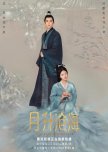
Birds of a feather.
The second part of Love Like the Galaxy 月升沧海 (The Moon Rises over the Ocean) is shades darker as Cheng Shaoshang struggles to open her heart and mind while Ling Buyi's secrets and inner demons are revealed. Their romance plays out in the bosom of the royal family, where Shaoshang blossoms under Empress Xuan's affection and tutelage. This subjects our golden couple to much envy and political intrigue.Shaoshang of Part 1 is disappointingly over empathetic and likeable. Shaoshang of Part 2 is immature and frustrating to the point of being dislikeable, This is exactly how she is meant to be depicted and the portrayal I was waiting for. So I must applaud Zhao Lusi for so daringly rendering Shaoshang as a difficult, often petty, unforgiving, vengeful child woman who wallows most unbecomingly in self pity. As an unloved child, Shaoshang is terrified of love. While she tries to figure out what she wants in a partner, she puts up all kinds of walls and clings to any excuse to not allow Ling Buyi in. She is her own worst enemy, fighting happiness every step of the way. Ling Buyi's infinite patience and indulgence of her is so hot anyone else would have succumbed to raging hormones in short order. Not Shaoshang though. She knows her worth and digs in her heels to demand to be an equal partner in every sense and meaning of that term. While highly usual for a woman of that time, it resonates with modern audiences for obvious reasons.
There aren't really good villains in this drama. That is because Ling Buyi is such a chilling character that he is already as close to a villain as can be. He is a man with a secret, one whose entire raison détre is to uncover the master mind behind the Gu City massacre and to avenge the Huo clan. He did not expect to fall for anyone and certainly not Shaoshang. He meant it when he said they were on different paths. On many occasions he merely eases her way with the intent of letting her go but never quite succeeds. He loves her selflessly and indulges her worst instincts, especially her vengefulness. Hence Yuan Shen's blinding epiphany that Buyi and Shaoshang are birds of a feather. They are rebellious and vengeful eye for an eye kind of people who can't tell the difference between a chicken and a duck. They are also at surface cold, unforgiving even selfish but in truth feel deeply. I find Wu Lei's acting in Part 2 more natural and compelling. He is such a patient, warm and tender person but only for Shaoshang. This is utterly different from the cold-hearted, calculating general who is a borderline psychopathic killer to his enemies. Wu Lei's combat scenes are simply the best. The aesthetic camera angles and gorgeous choreography brilliantly captures his stunning athleticism and graphic, muscular, ferocity that is capable of mowing down an entire battalion.
For me, Empress Xuan is the true hero of this story. As much as I enjoyed Buyi and Shaoshang's journey, it is her story and that of Wen-di and Consort Yue that I find so much more complex and moving. Told with epigrammatic dark humor that dulls the edges of their pain and sacrifice, they are nonetheless imprisoned by values that are bigger than themselves. While Consort Yue lashes out with wit and acerbity, Empress Xuan suffers in dignified silence. Do not be angry with Shaoshang for finding it so difficult to forgive Buyi. Although his cause is just and the outcome serves the greater good, it cost Empress Xuan everything. Shaoshang's first unselfish, grown up act is to accompany her, to atone for what Buyi did and for how she unknowingly helped him. That is what devastates her as much as Buyi reneging on his promise to her. Buyi knows and understands this. Without Empress Xuan's forgiveness and generosity of spirit, they may not have found a way to forgive themselves and each other. Her love is truly like the galaxy in its vastness and selflessness. The galaxy owes it to her to make sure she and Wen-di do not meet again.
In terms of storytelling, very much like Part 1, Part 2 wastes too much time on too many delusional love sick women who conspire against the lovers. This comes at the cost of the storytelling. which towards the end suffers from heavy cuts and sloppy editing. As a result, characters like Lou Ben and Tian Shuo are not properly fleshed out and I did not feel that invested in either the Peng Kun or Guo Village arcs, which feel rushed. When they could have simply omitted both the Fifth Princess and Luo Ji Tong's arcs which were superfluous to the plot. It also underscores how nasty, dumb and divorced from reality the vast majority of the women in this drama are. I really do not like this type of misogynistic and cynical depiction of womenkind. Even though the ending is very satisfying, especially when it comes to the character stories, the unfolding of the plot which we waited way too long for is not well done. Considering the stunning production values, it is a shame if they do not go back and re-edit it with some of the cut footage into a Director's Cut.
All things considered, I enjoyed this beautifully written drama immensely. I find Part 2 slightly better than Part 1 and am pleased to rate the drama in its entirety and Part 2 on a standalone basis a 9.0, better than my 8.5 rating for Part 1 by itself.
Was this review helpful to you?

Hope is not a strategy.
The Hope is the Chinese adaptation of a Japanese manga Dragon Zakura about an unconventional teacher who takes on a class of underachieving students. While I haven't watched the Japanese television version, this Chinese adaptation has clearly been heavily localized even though it retains a manga-like flavor in certain characterizations and comedic sequences. This drama critically examines the Chinese education system and its strong emphasis on the all-important Gāokǎo/高考 nationwide college entrance exam which takes 9 hours over two or three days. In a nation of largely single-child families, nothing is more important than getting their only child into the college of their dreams. With over 10mm taking the Gāokǎo each year, the competition is intense. Even though the pass rate is very high (85-90 percent), a minimum score of 600 (out of 750) is needed to gain acceptance to the most elite universities. Less than 7pct of students are accepted at these top universities and the acceptance rate at Qingbei (Tsinghua University and Peking University) where the crème de la crème matriculate is less than 0.1pct.After a series of entrepreneurial setbacks, star lecturer Lei Ming returns to teaching. He teams up with Sang Xia, a psychology teacher on an experimental program to turn around students that are not living up to their potential. His handpicks five students for his experimental Class 11; an orphan Li Ran, a math whizz Cheng Yushan, an aspiring rapper Jiang Qinglang, gossip girl Bian Xiaoxiao and the browbeaten Yu Yang. With Gāokǎo just a year away, his lofty boast of getting all five of them into Qingbei is widely ridiculed. His biggest skeptics are the students themselves and Sang Xia. His methods though unconventional are hardly trailblazing; much of it involves tried and tested methods used by successful students including time management, minimising distractions, identifying focus areas and being tactical about selecting courses. The drama makes it clear that hope is not a strategy and that while there are smarter, better ways to study, there is just no way around putting in the hours.
This is an exceptional drama that makes a poignant and compassionate case for students who have fallen behind. It exposes how they are failed by an indifferent sink or swim kind of education system. Each of the young actors does a fantastic job portraying their hardships, self-doubt and how they discover their best selves in their struggle against overwhelming odds. I don't have a favorite among them because they all have their own special talents, their own crosses to bear and blossom in their own ways as they learn to take ownership over their own destines rather than just being victims of circumstances they can only change at the margin. Lei Ming and Sang Xia are like fairy god parents who can help but can't make their lives perfect. Rather, they impart upon them the invaluable gift of learning how to cope and the ability to feel compassion for others. This is seen in how the understanding they show poor little rich boy Shen Yao and Lei Ming himself when he lets them down. In saving them, in many ways Lei Ming saves himself.
As for Zhang Ruoyun, he once again shows his uncanny ability to pick fantastic scripts. As always, he leaves so much runway for his young co-stars to shine and lets this story really be about them without defaulting into simply being a plot device. Because his Lei Ming is far from perfect; he is cynical and beneath his confident facade, deeply damaged by his resentment of his father, the great teacher Lei. In helping Class 11 in their struggles with Gāokǎo and their personal devils, he gains perspective on his own journey many years ago and gains some understanding of his father. My heart was in my throat watching Zhang Ruoyun portraying this role so movingly in light of his own difficult relationship with his father. Probably largely due to Zhang Ruoyun's powerful charisma, I found Sang Xia's constant baiting and argumentativeness to be pompous and super annoying initially. But she grew on me and I came to appreciate how their relationship actually thrives on calling each other out and challenging each other to do better.
This drama for all intents and purposes ends at episode 29 and it is fine to just stop there. The episode 30 "twelve years later" epilogue replaces the young actors with older vague lookalikes. That broke my connection with the young actors that I grew to love so much. I didn't mind the sober tone of the epilogue. It delivers the right message that there are no absolutes in life; that even Qingbei is no guarantee that all's well that ends well. The biggest lesson learned, the one that stands the test of time beyond all the academics is about coping with life's ups and downs. And they are still young enough that the whole world still lies ahead of them so their journey continues. My biggest issue with it is I had hoped for better for Lei Ming. But I guess that is what makes this drama so special; this ability of to be so incredibly inspiring yet so unbearably realistic at the same time. If you wish to skip the realism, then call it a day at episode 29. It still falls short of a fairytale but at least there is an abundance of hope.
This is a highly recommended and very memorable watch that I enthusiastically rate 8.5/10.0.
Was this review helpful to you?
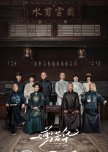
A cut above.
This is a wonderfully produced drama that deserves a lot more attention. It is a riveting tale of sibling rivalry that spans a time of rapid change and turbulence in modern Chinese history. Jiang Mosheng and Lu Yuanzhi are both adopted and apprenticed by Master Su Jingan of Sancai (Triple Cut) House, couturier of the Qing Imperial Court. Sancai House routinely outshines other rival houses in the workmanship, symbolism and design of the intricate ornamentation of the Dowager Empress' court robes, allegedly due to their seamless stitch, a tradecraft that is passed down from one generation to another. Master Su's most bitter rival is his former fellow apprentice, Master Bai Henian of Sihe House.Jiang Mosheng is the older, steady, responsible brother and heir apparent, whose great talent is meaningfully enhanced by his passion and dedication. Lu Yuanzhi is the hot headed, audacious and visionary brother; a rare talent whose brilliance is nothing short of genius. His recklessness however lands him in serious trouble. To save him, Mosheng cuts ties with Sancai House, defects to Sihe House and accepts Master Bai as his foster father. This sets the brothers down a complicated path of reluctant rivalry, conflicting loyalties, mutual friendships, convenient alliances, mistrust, betrayal and forgiveness. The most prominent feature of this drama is the Abel and Cain relationship between the brothers and it is well written, consistent and riveting. Both of them are flawed characters and neither is completely blameless for how things play out between them. Although Yuanzhi learns to rein in his recklessness and temper as he matures, it still manages to get the better of him. His culpability over Mosheng's sacrifice constantly lingers in the air between them. Even though he can be such an ass, I have to sympathise with Mosheng's battle with his own worst instincts in the shadow of someone who is perpetually a cut above. Both Zhang Haowei and Hong Yao delivered excellent, empathetic performances, alternately frustrating, enraging and beguiling me at all the right moments.
How the design of the cheongsam or qipao evolves to reflect the changing attitudes of times is the main, fascinating centrepiece of the drama. While not in the same league as the more modern and sophisticated qipaos of Wong Kar Wai's iconic In The Mood for Love, all of the outfits from the Qing court robes to the Western flapper dresses are simply gorgeous and I truly enjoyed the mini history of Chinese costume. How the female characters are dressed is also symbolic of who they are - Yaoyao is a remnant of the past at sharp contrast with Lijun, the ultimate, progressive modern woman. Kang Ning sits in the middle - she embraces change in a way that marries it with tradition; and thus she is truly Yuanzhi's muse. True to character, both Kang Ning and Lijun have a very refreshing attitude towards relationships and love that I truly enjoy and they fight to write their own stories even when events conspire against them. The only character I didn't like is Yaoyao who is your typical c-drama archetype but she is written that way as a foil for the other two. There are enough dimensional, grey and consequential characters in this drama that I am very satisfied with the character aspects of it. Most of these key roles are performed by veteran actors whose acting often surpasses the quality of the dialogue. I laughed my head off at the dynamics between Lijun, Feiyu and her father.
This is largely a character driven drama where the main characters have to cope with the changing times as they transition from the Qing era to the Republican era and Japanese incursion. While the pace is fast with many exciting and unexpected turns along the way, not all of the sub plots and arcs are consistently well written. Some of the stressing events that the main characters face are a bit contrived, can be lazily written and at times defy logic. But between excellent acting and all the interesting character developments, I found the plot holes quite easy to forgive. I do appreciate how all of the characters go through rough times, experience loss, how actions have consequences and justice is often blind. The villains are decent but less interesting than the characters themselves, some of whom are quite grey if not outright vile.
I am happy to recommend this as a very enjoyable watch with some good fresh takes on old tropes. Overall for me this is an 8.0.
Was this review helpful to you?

All style no substance.
I was really excited to watch this Republican period detective drama. Having enjoyed Hu Yitian and Zhang Yunlong's chemistry in My Roommate is A Detective, I couldn't wait to see them team up again in a similar setting. The adaptation of Agatha Christie's Poirot mysteries seemed like an added bonus. Sad to say, despite the visually sumptuous set and costumes, both the characters and cases are bland, uninspired and the pacing is very draggy.While Situ Yan is the lead detective, he is not meant to be a literal adaptation of Hercule Poirot. Poirot with his known eccentricities including his fastidiousness and obsession with symmetry, is one of the the most distinctive, well dimensioned fictional detectives ever. He has a clear process and methodology that is based on human nature and psychology for solving the case. I would never cast Hu Yitian as Poirot and I am ok with the fact that Situ Yan is not Poirot. What I am not ok with is the colorless, cardboard characterisation of Situ Yan as simply a highly intelligent but rather lethargic lawyer with a strong sense of justice. Hu Yitian does his best with the role but he doesn't have much to work with. This is made worse by Luo Shaochuan, the money guy whose contribution to the crime solving aspects of the partnership is unclear. This character is so indifferently written it is not worthy of an actor of Zhang Yunlong's calibre. The two leads get little screen time together as they go down disparate paths in the investigations. Unlike their previous best loved collaboration, Zhou Mowan is more often Situ Yan's sidekick than Luo Shaochuan is. Thus we don't get to enjoy their banter and their incredible chemistry that builds up and fleshes out both characters as they work through the cases. While both female leads are well written and likeable, they crowd out the bromance.
When it comes to adapting these beloved Poirot classics, I am no die-hard Christie purist. I am receptive to and have seen good adaptations that take a fair amount of liberties with the original works. This can be successfully achieved because changes notwithstanding, the adaptation remains true to the essence of Christie; the psychology of the crime. This is where Checkmate fails to deliver. The supporting cast is very mediocre and lacks screen presence. Bland storytelling and poor pacing with unnecessary romantic digressions disrupts the build up in suspenseful tension into the final reveals. The cases must be evaluated convincingly from the point of view of each character, to assess their psychology as a sense of imminent peril escalates. Who was the victim? Why would someone want them dead? Who would cross that line and actually do the dastardly deed? This drama fails to make me feel invested in the human aspects - the victims and potential suspects; it fails to create a sense of urgency to solve the case or engender that mixture of sorrow, pity and revulsion for the perpetrator that is signature Christie.
The first case is Murder on the Orient Express, a well known case that has been adapted to death. While this version does not stand out, it stays close to the original and is fairly well done. Although Roger Ackroyd is also quite well done considering how difficult it is to adapt an unreliable narrator case into this format, from there, things start to go downhill. These cases are masterpieces; material changes should be weighed carefully and not made with the misguided idea that such impeccable Christie plots have scope for improvement or merely for the sake of delivering a surprise twist. Which is what they did to one of my personal favourites. They went for the plausible alternative solution which simply did not fit the human nature aspects of the case. And thus fails to deliver Christie's magic wow factor, the thrill and the chill and that sense of shock, sorrow and acceptance that it all made sense; that it is the best and only solution. It devolves further as cases are stitched together in a cut and paste fashion that is increasingly incoherent. The final case bears little resemblance to what I think must be the original. While it took no genius to spot the the final antagonists a mile away, their motives are uninteresting and unconvincing and the ending is frankly farcical.
If you are a Christie purist, I would say avoid this drama. You will feel they have desecrated some of the author's best works. If not, this is a watchable if unexceptional adaptation. The production values are quite good and the Republican period setting in Harbin has some novelty appeal even though the drama overall is all style no substance. This is a 7.0 for me but I would have rated it 7.5 if they didn't ruin Five Little Pigs and finish in such an absurd manner.
Was this review helpful to you?

Identity Theft.
Here we go again - yet another ill-fated master disciple relationship! This starts predictably with a jinxed mortal Wei Zhi barely squeaking through into the prestigious Egret Academy. There her astounding lack of talent catches the attention and empathy of her master, Yan Yue. He is an immortal sent to discover and vanquish the remnant of the phoenix bloodline that is a threat to the Three Realms. You would never guess who the hidden phoenix is or that this cold faced inheritor of the realms falls in love with his enemy?!?Within a tired and tropey premise, the plot design of Beauty of Resilience is actually pretty good with some interesting and innovative takes. I found the Egret Academy's challenge arc to be very enjoyable in a way reminiscent of the Triwizard competition in Harry Potter and the Goblet of Fire. And I was intrigued by the mysterious Zihua Book Pavilion and its Shylock like master who extracts his pound of flesh. I also like that the Heavenly Empress is not just a decorative vase but has a rather important function as the mistress of time. Even the concept of Hua Rong is fresh and mysterious. Yet these ideas just don't quite come together in a good way in terms of plot and character progression.
Indifferent character blueprints, mis-cast roles and uninspired portrayals are this drama's weakest features. While Guo Junchen's portrayals of multiple roles is technically faultless, he is not given much to work with. Yan Yue is just a cardboard xianxia archetype. He only gets to shine briefly as the morally conflicted Chen Yan and in his darker personas but enough to impress as a diverse young actor. He and Ju Jingyi look fantastic together and they actually have decent chemistry. While her acting here is more nuanced, Ju Jingyi, once again delivers the same old vapid, completely indistinguishable portrayal that is her comfort zone. This is compounded by her default styling with atrocious Persian princess head gear and heavy handed and unflattering eye makeup that makes her look like she just waltzes from one set to another. She actually has excellent comedic timing which sadly this humourless script gives her no chance to showcase. Mu Nan is the only engaging and empathetic character but is sadly matched up with the most tedious and mis-cast role. And that is just the tip of the ice berg in terms of how shabbily the writers treat him.
The supporting roles are one dimensional and the cast lacks experience, chemistry and rapport. Everyone is obviously acting and their relationships and interactions are so forced I couldn't engage with or care for any of them. There were way too many identity thefts going on where even the lead actors in the swapped roles are unconvincing as the characters whose identities they stepped into. It was so bad at times it was kind of funny. The villains are quite obvious from the beginning and they weren't satisfactorily dealt with. One of them perished so quickly I literally blinked and missed it. I went episodes thinking they were lurking for the right moment to pop out again. My hope for a satisfyingly long, painful and drawn out demise was never met.
This drama's strongest arcs are the early ones that take place in the mortal realm. After that the drama loses momentum and gets more ridiculous as it progresses. The ending however is quite original and quite cool but was so rushed and poorly executed that it took awhile for what actually happened to sink in. I would say this is something that you could watch up until the wedding in the second arc, skip all the messy and time wasting latter arcs and you'd still end up in the same place. The early arcs were a watchable 7.0/7.5 for me but I'd at most rate the latter arcs 5.0 for an overall rating of 6.0. Watch at your own risk.
Was this review helpful to you?

Lost and Found.
Set in the 1990s, this is a riveting suspense thriller about three teenage boys who go missing on a dark and stormy night. Three years later, Xiao Qi, a pick-pocket is caught and identified as one of the missing boys. He is reunited with his grateful family but he does not seem quite the same and claims to have little memory of what transpired three years ago. This revives the investigation of the old case, with Wang Shitu leading the investigation. His investigation shines a spotlight on human trafficking rings. His search is painful and personal as his son has been lost for more than a decade. As the investigation advances, he gets to know Xiao Qi and the Jin family and more questions emerge as to what really happened that fateful night.This drama does a terrific job building suspense, planting the seeds of many credible explanations with each frightening new reveal. Mystery buffs will enjoy trying sorting through all the lies to pull all the pieces together. The first villain's confession however was not convincingly obtained and that case is too hastily tied up to focus on the final villain. There are too many confessions obtained using this same threat of shaky evidence against a loved one. Even though a shadowy image of the main villain and what must have happened emerges early on, the cat and mouse of pinning them down is riveting. This is one of the most layered, selfish, manipulative and just plain evil sociopaths I have seen in a long time. What is truly scary is their motive is vile but understandable; that this is easily something someone, anyone is capable of doing simply because they want what they want badly enough. The final solution however is somewhat anti-climatic; there are many more interesting ways this could have played out. There are also a fair number of plot holes and loose ends.
The strongest and most moving aspect of this narrative is not the mystery but the relationships that evolve around it. The mother and the father who lost a child and the unimaginable and continuing pain that they endure. And the lonely boy that was lost and found, and how through all this mess they somehow manage to heal a small part of each other. With this kind of cast, I don't have to praise the acting. Zhang Songwen and Rong Zishan's chemistry is well established and as expected, they deliver in spades and make me root for them every step of the way. But the most surprising and distressing performance is Guo Keyu's portrayal of Bian Meizhen's confused longing for her lost child and her devastating moments of awareness.
Overall, the mystery plot is good but does not live up to its early promise and is not as tight as could be. But the character arcs are superbly done and the ending is perfect and brilliant in the most realistic of ways. This is a highly recommended 8.5/10.0.
ENDING SPOILER COMMENTS
Doudou was a red herring from the start and considering the theme of this story is lost children, it is no surprise that there is no fairytale ending. Nonetheless, Wang Shitu does not give up and continues to look. This kind of story is not easy to write or to end in a way that acknowledges and respects the suffering of victims of child trafficking. Jin Manfu is the manifestation of what must be every parent with a lost child's worst nightmare. But this story also reminds us that there are Wang Shitus and Bian Meizhens in this world who can still open a corner of their hearts. And that maybe they can also find some solace by opening a small part of their hearts. The only small bone the drama throws the audience is Doudou probably ended up in a family with a dog and where he is much loved and may one day still be found.
X
Was this review helpful to you?
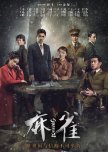
The enemy of my enemy is my friend.
This is the spy thriller that I will compare all other Republican period spy thrillers to going forward. It is that good. Each of the engrossing 61 episodes just flew by and I haven't been able to watch anything else since. I put this off for a long time due to poor reviews of the female lead's performance, which unfortunately is beyond dreadful. The rest of the cast however, is so phenomenal that they more than make up for it, to the point that the rating simply does not do justice to this drama.Set in 1940s Shanghai during the Wang Regime (Japanese puppet government), Chen Shen works for his best friend Bi Zhongliang who heads up the Special Operations Division. At surface, he is an indolent playboy, an aspiring barber until he was propelled into a position of favor and authority for saving Bi Zhongliang's life. In reality, he is a double agent loyal to the CPC. Things get complicated when his former student and true love Xu Bicheng and her husband Tang Shanhai are assigned to the Special Operations Division. The paranoid Bi Zhongliang eyes them with suspicion because Bicheng is his superior and rival Li Moqun's niece. He is already under growing pressure from both Li Moqun and their ultimate superiors, the Japanese for failing to capture the notorious communist spy Sparrow.
The overarching plot of this drama is rather simple and clean. The main communist and nationalist protagonists have just one mission; to steal the Return to Zero plan hidden within the Special Operations Division. The antagonists are aware of this and use this knowledge to try to trap them into revealing themselves and to capture Sparrow. The subplots and unpredictable way the storyline unravels with many twists along the way are largely driven by the characters as they react to stressful life and death situations that force perilous split second decisions. One of the weaknesses in storytelling is that the writers resort to coincidences and sheer luck a little bit too often to facilitate twists or bail the main protagonists out of tricky situations. Nonetheless it all comes together to deliver an intense aura of suspense that builds towards the thrill of unexpected victories, shocking betrayals, blindsiding plot twists and sudden death.
Chen Shen is the perfect spook - he is on the one hand an innocuous ladies man; a charming, stylish teetotaler who can't even bring himself to fire a gun. Yet he manipulates Bi Zhongliang masterfully; ruthlessly stoking and soothing his insecurities at the same time. This is by far the most fascinating relationship in the drama. Although he mistrusts Chen Shen, Bi Zhongliang is also touchingly sincere and protective of him. Chen Shen's feelings towards him are complex; they have an unusual bromance that pulls them together regardless of the fact they are on opposite sides. Chen Shen is not only the most intriguing character in the drama, he is also considerably more ruthless and manipulative than the main antagonists. This is by far Li Yifeng's most memorable role to date, well complemented by Zhang Luyi's disarming portrayal of Bi Zhongliang. The dialogue is sophisticated, pointed, witty and laced with sarcasm and dark humor that often relieves suspenseful tension with laugh out loud moments and encapsulates the complex character dynamics.
Even though I am a huge sucker for morally ambiguous characters like Chen Shen, there are almost too many moments where Zhang Ruoyan's Tang Shanhai eclipses him. And it is not just because he looks so incredibly scrumptious in a suit. Too often the second male lead is dumbed down to elevate the male lead. While it is true that Tang Shanhai is not quite the consummate spy that Chen Shen is, Zhang Ruoyun pulls this off without portraying Tang Shanhai as less intelligent; just a tad less ruthless, a tad less composed and a lot more heart. He is thrust into many parallel situations with Chen Shen but the way he processes and reacts to the situation, how he is clumsier at manipulation, how his remorse is more visible; makes it clear that he is a less hardened spy. His relationship with Chen Shen evolves from rivalry and distrust into mutual respect and a grudging friendship that compels the two to work together when their interests align. The enemy of my enemy is my friend is a recurring motivator in this drama that pits multiple characters alternately with and against each other.
The female lead, Xu Bicheng is by far the drama's weakest link. Unlike many, I don't think the writing is the problem; on the contrary I find the character to be one of the best written, most complex female roles out there. Bicheng is a flawed character; stubborn to the point of recklessness with a bleeding heart for lost causes who wears her heart on her sleeve. She is also often underestimated, can be very cunning, is a fantastic liar when cornered and is able to manipulate both Chen Shen, Tang Shanhai and Tao Dachun into doing what she wants and her character undergoes tremendous growth. None of these positive aspects are conveyed by the acting because Zhou Dongyu is a very limited actress who just lazily recycles the same four boring, mopey, terrified and pitiful expressions throughout the drama. The only things she does well is child ugly cry and child uninhibited smile from the heart. Which is wonderful... if she were playing a child. In this role, it is at odds with the role of a woman in her mid twenties, a spy and a married woman for crying out loud. It is also obvious no one ever told her it does not suit her naturally rather mature facial features and incredibly grown up styling in this drama. She fails so badly at projecting that je ne said quoi that has every man fall in love with her that its not even fitting to call her a Mary Sue even though she does need constant rescuing. I could not empathize with her at all and couldn't care less what happens to her.
Kan Qingzi was robbed - her Li Xiaonan stole the show and she really deserves top billing as female lead in this show. Her performance puts Zhou Dongyu's to shame even though the character is at surface, less complex and interesting. I normally loathe ditzy, lame characters like Li Xiaonan who are capable of loving wholeheartedly even when it is not reciprocated. But wow, she made me laugh, she made me cry, she made me respect her single-mindedness, I was 100 percent behind her. And that is what a good actor does, it is what every actor in this exceptional cast other than Zhou Dongyu managed to do - impress me with their acting and make me empathize with them even when they play dark or weak characters. Geez even Yin Zheng or especially Yin Zheng managed to make me empathize with his portrayal of the rabid, vicious, cruel and dangerous Su Sanxing.
A criticism of this drama is that love seems to have overshadowed the spy story; that the unrequited love trope is perhaps overused in this drama. While there is some truth to that, this is still very much a spy thriller that is chock full of excellent twists and turns. And the bigger point is that the unrequited love trope is used brilliantly to explore how each of the main characters bestows and responds to unrequited love in completely different ways. I normally approach Republican dramas with a stone cold heart - I go in pretty much expecting everyone to die it is just par for the course. In this one, too many characters still managed to steal my heart and made me bawl my eyes out. That said, the drama ends very fittingly after the final showdown.
My favorite line in the drama is Chen Shen's heartfelt "Please... don't tell anyone you were my student." This is by far the best Chinese spy thriller I have seen to date (August 2021). This is a 9.0 for me but I could easily rate it 9.5 were it not for the appalling execution of the female lead role.
Was this review helpful to you?
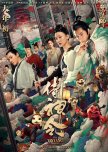
在下晴明 - Qingming is in the house.
在下晴明Yes! Yes! YES!!!
Qingming is in the house!!!
That is THE most striking difference between Yin Yang Master and Dream of Eternity, where I was like - Huh?...what??? Detective Dee?? Where is Qingming??? Where oh where is my yin yang master? THE Yin Yang Master? And in this Chen Kun just delivers the wickedly enigmatic and alluring essence of Qingming, a diabolically powerful, magical, misunderstood half human half demon that walks the world in between.
This version of Yin Yang Master's plot is much simpler and thus, better executed. It hones in on the life and death bond between a demon familiar shi shen/侍神 and their master zhu ren/住人. Falsely accused, half human, half demon Qingming is estranged from his zhu ren Baini and the Yin Yang Bureau. They reunite in a desperate attempt to recover an artefact that can set a powerful demon free; a quest that tests and lays bare their true loyalties and exposes past betrayals. Chen Kun and Zhao Xun's chemistry never fails to thrill, captivate and move me and they effortlessly convince me of their life and death bond. What I also love is that Qingming is not just uselessly waving his hands in the air reciting incomprehensible incantations. He really jumps into the thick of the fray in a way that leaves no doubt that he is in it to win it. In every life endangering encounter there is that nail biting sense of urgency, intensity and imminent peril. This fantasy world with its human and demon yao/妖 inhabitants has a very adorable, young adult and enthrallingly magical feel to it. In many ways, it captures the essence of Disney in that it speaks to two audiences both kids and adults with its clear message that both humans and demons can be monsters.
The only thing I really did not enjoy in this movie were the second leads - both actors were juvenile and did not deserve the screen time that they got. The animated characters like the Evil Red Ghost and side characters like the Peach Blossom Fairy were far more compelling and managed to capture my heart over those two jokers.
Overall this was a very entertaining movie - Chen Kun fans like myself will obviously be able to find many things to like and I can see kids just absolutely loving it. I rate it 7.5.
Was this review helpful to you?


 52
52 179
179 8
8





















